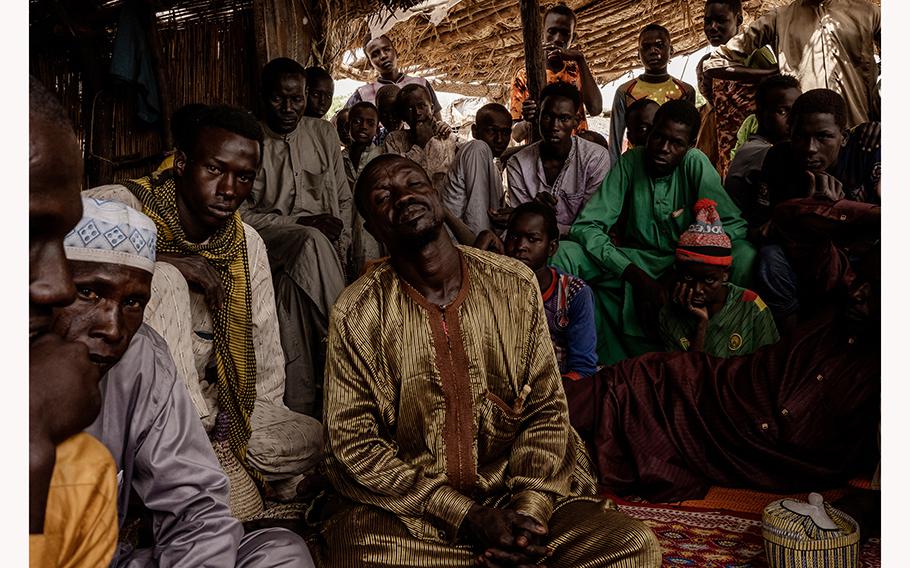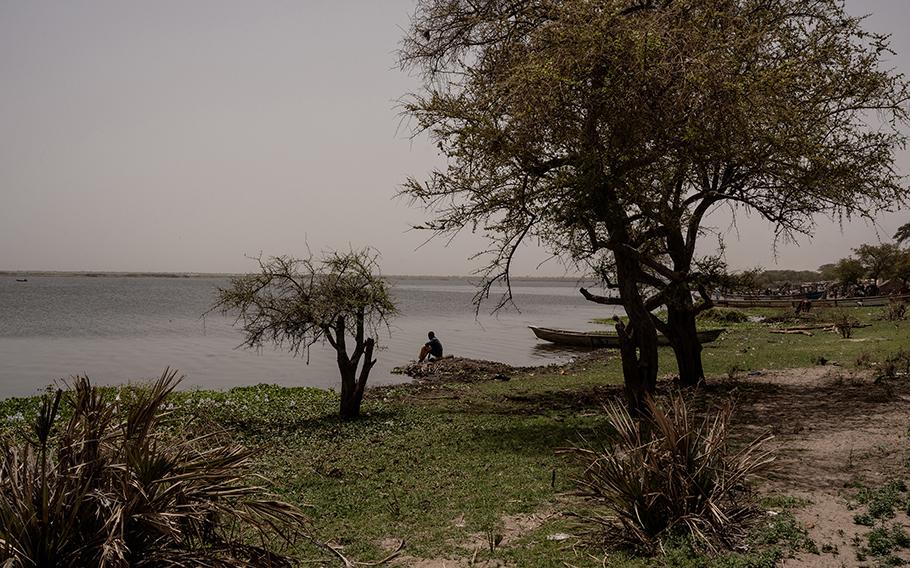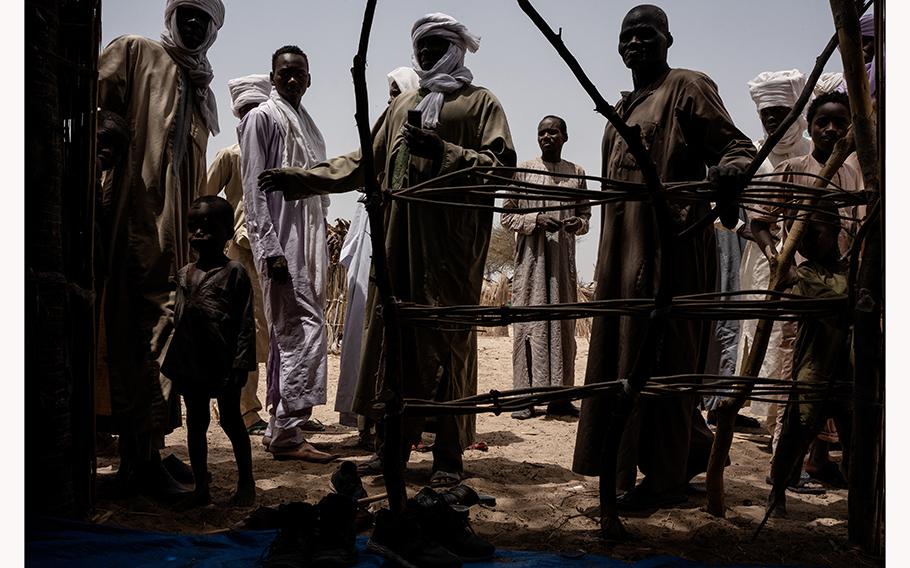
On Koulfoua island, in Chad, Hassan Mbodou, 50, front right, said his brother joined a militant because of desperation after losing cattle and struggling to catch fish. (Adrienne Surprenant for The Washington Post )
KOULKIMÉ, Chad - Alhadji Yaro was a teenager when Boko Haram militants stormed onto his island in the vast, blue-green waters of Lake Chad and made villagers an offer at gunpoint.
"'We will give you good lives,'" he recalled the fighters' saying as they urged young men to join them. "'You will have everything.'"
Yaro felt fear mixed with curiosity. He said he had grown up during a time of relative abundance, before changes in the weather started to mean smaller and smaller harvests for his family. Then, a few months before Boko Haram showed up in 2015, a flood destroyed their crops of corn and millet, leaving Yaro's family with nothing.
Throughout the Sahel, the region that stretches across Africa below the Sahara Desert, climate change is raising temperatures, increasing droughts and making rainfall less predictable, researchers say. These changes, in turn, are helping fuel Boko Haram, an Islamist extremist movement born in the 2000s in northern Nigeria out of political grievances, and stoking its violence, according to interviews with former militants, local leaders, military officials and researchers.
Climate change, they say, is reducing the economic prospects of young men in this part of Africa and making them more susceptible to recruitment by violent extremists. This dynamic reflects a broader finding by the United Nations this year that the opportunity for jobs, rather than religious ideology, is the main reason that people join extremist groups across Africa.
Local residents and researchers say that climate change also fosters conflict in the Lake Chad region, as extreme hunger pushes people to begin fishing and farming in areas controlled by extremists. The Lake Chad area - where the borders of Chad, Nigeria, Cameroon and Niger converge - has provided bases for Boko Haram and other militant groups since 2014.
Military officials at the U.S. Africa Command said they view climate change as a "threat exacerbator" in the Lake Chad region and elsewhere. They said they are closely studying the connections between climate and conflict, because Africom's area of responsibility involves some of the Sahelian countries most vulnerable to climate change, including Mali and Burkina Faso, where Islamist violence is spiraling. An official in the French military, which has one of its largest African bases in Chad, agreed that climate change contributes to the conflict.
Worldwide, more than half of the 20 countries considered most vulnerable to climate change are experiencing armed conflicts, according to a report by the International Committee of the Red Cross (ICRC). Chad, a landlocked nation of 17 million, is ranked the third-most vulnerable.
"Climate change didn't cause this conflict, but it is compounding existing dimensions of the conflict," said Janani Vivekananda, the head of climate diplomacy and security with Adelphi, a German think tank. "Then the conflict reduces people's ability to cope with climate change . . . which then creates new conflict."
Yaro, who has lived in a dusty displacement camp since surrendering to Chadian soldiers, said the riches that Boko Haram promised never materialized.

A man sits by the water in Koulkimé, by the side of Lake Chad, in Chad, on April 1, 2023. (Adrienne Surprenant for The Washington Post )
"When I got there, all they gave me was a gun," said Yaro, now 26, his eyes downcast as he remembered details of the years he would rather forget. "They told me that if I wanted to eat, I'd have to go and fight."
Inside the red zone
The lake was quiet on a recent day as two motorized pirogues cut through the gentle waves, blue water stretching toward the horizon.
The islands in this area are included in a red zone; many displaced residents have decided it is too dangerous to return here, and most aid groups, other than the ICRC, have deemed operating here to be too risky. After Boko Haram fighters began their sweep across Lake Chad nearly a decade ago, they killed scores, kidnapping entire villages, pressuring young people to join and burning the homes of those who refused.
On the island of Koulfoua, where children played along the shores and women sold fish, Chief of the Canton Mahamat Ali Kongoi said a near-total lack of economic development has made the area fertile ground for extremist recruitment. Kongoi, the local leader, noted that few here make it past primary school and have no options but farming and fishing.
Most do not know what climate change is, he said, much less what is causing it. But he said they know intimately that the weather is less regular than it was and that because of it they are poorer.
In the past 30 years, the average temperature in Chad has been about 2.5 degrees Fahrenheit higher than during the period between 1951 and 1980, according to the World Bank. There has been a threefold increase in the intensity of rainstorms across the Sahel, including in Chad, since 1982, British researchers say, and the pattern of rainfall has become less predictable.
The insurgent groups have taken advantage of these factors, Kongoi said, his voice heavy with resignation. "They have means," he said, "and they utilize their means to convince people who have nothing."
Choosing insurgency
The makeshift village of Koulkimé emerges from Lake Chad's sandy shores, a cluster of shelters constructed with nothing more than reeds and blankets. For years, it has housed hundreds of families displaced from the islands by Boko Haram. About 200 men in this part of Koulkimé, local leaders said, were members of Boko Haram or the rival Islamic State West Africa Province (ISWAP) group who have since surrendered.
Yaro, now a father of four, lives in a neatly swept shelter so small that cooking materials have to be stored on top of it. He said that when he was growing up, he lived in a bigger house made of brick on an island near Nigeria. Fish, cows, goats, millet and corn were abundant.
But sometime during his teenage years, Yaro said, he noticed that the seeds they planted no longer yielded as much as before. So he was already struggling to imagine a future before the flood wiped out his crops and Boko Haram arrived.
Stories like Yaro's are common, according to interviews with six former Boko Haram members in the Lake Chad region. They said that some who joined the group were forced to do so, while others signed up voluntarily, often motivated by a combination of economic problems and frustration with the government.
"They join because of hope and because of revenge [against the government]," said Malimiti Mahamat, 35, a former Boko Haram member. And they join, he said, "because the harvests are small and the water levels are changing."
Mahamat Abdoulaye, 33, who said he was forced into Boko Haram in 2014 when he was a fisherman, said many in the group were young, desperate for money and saw no other way to get it. Many of those who joined the Islamist extremists for economic reasons were still fighting, he said.
Back on Koulfoua, Hassan Mboduo, 50, said his brother joined the militant ISWAP group in 2019 because fish had become scarce in the lake, a phenomenon that both men blamed on changes in the weather. Mbodou said he begged his brother not to go. But his brother insisted. "'I have to feed my family,'" Mbodou recalled his brother saying as he left.
After enlisting with Boko Haram, Yaro shifted his allegiance to ISWAP. The group's leaders instructed members to rob and intimidate villagers to get supplies, he recounted. Yaro said he fired on soldiers across the border in Nigeria but did not know whether he killed anyone. "They said it is about religion, but it is nothing close to religion," he said.
After a few years, Yaro recalled, he decided to escape from the islands where the extremists were holed up, and he commandeered a pirogue with three friends. They paddled as fast as they could to the shore. Being caught would mean death. He said he still remembers the loud beating of his heart.
A deadly calculus
Climate change and violent conflict can create a vicious circle, according to Vivekananda and other researchers.

About 700 families live in Koulkimé, in Chad, and local leaders say that some 200 of them include former members of the Islamist extremist group Boko Haram. (Adrienne Surprenant for The Washington Post )
In areas without conflict, people can adapt to changes in the weather by moving, for instance, searching out dry land when there is flooding and more-fertile areas when there is drought. But in areas where violent extremists are active and the military is waging a counterinsurgency, as in the Lake Chad region, people either go hungry or relocate into the sights of the militants.
Ali Abdallah, 40, said he and his brother had long tried to farm the dry land outside the village of Baga Sola. But after years of struggling to feed their families, relying mostly on money from the Irish nonprofit organization Concern Worldwide, the brothers decided in 2020 to start farming on the islands, despite the danger posed there by Boko Haram.
For a couple of years, it went well, Abdallah recounted. He and his brother were able to bring rice and potatoes home to their children. Then, one rainy night a few months ago, Abdallah said, he woke to the sound of gunfire. Insurgents had attacked their camp, fatally shooting his brother. Abdallah fled into the water.
Many who live in the region say family members and friends have faced a similar fate.
Kaka Koura, 40, a mother who lives in a one-room house, had begged her husband not to begin fishing on the lake. But she said so few options for sustenance existed on land that she could not stop him.
She said she learned he had been killed in an ambush after she heard the wailing of other women who'd lost their husbands in the same extremist attack.
Fear that conflict is inevitable
Scientists predict that as the world warms, the Sahel will be a hot spot, with temperatures here estimated to rise 1.5 times faster than the global average. It is likely that by the middle of this century, more than 40 days a year will exceed 95 degrees F, according to the U.N. Intergovernmental Panel on Climate Change. Water shortages will increase and crop productivity will decline, the IPCC found.
Cameroonian Brig. Gen. Assoualai Blama, who helps lead a multinational force combating the insurgency, said the military has been defeating Boko Haram. But when he thinks about the future of the Lake Chad region, he worries, he said. The changing climate means there will be fewer economic resources to split among a growing population. Conflict, he fears, is inevitable.
Already, some former Boko Haram members say they feel trapped. After spending a few months in reentry camps run by the military, the men were released back to their families. But these days, they explained, there are even fewer opportunities than before because of the increasingly erratic weather and the shrinking area that is both arable and safe from extremists.
Ahmat Souleymane, 30, was a fighter with Boko Haram and then ISWAP. In the years since he escaped from them, he said, his wife and child have died of sicknesses that he blames on poor living conditions.
Now, he admits, he'd be ready to return to the militant fold - if only the groups would not kill him as a deserter.
"Dying here is not a solution," he said.
Mouta Ali contributed to this report.